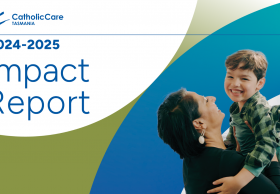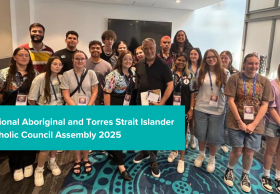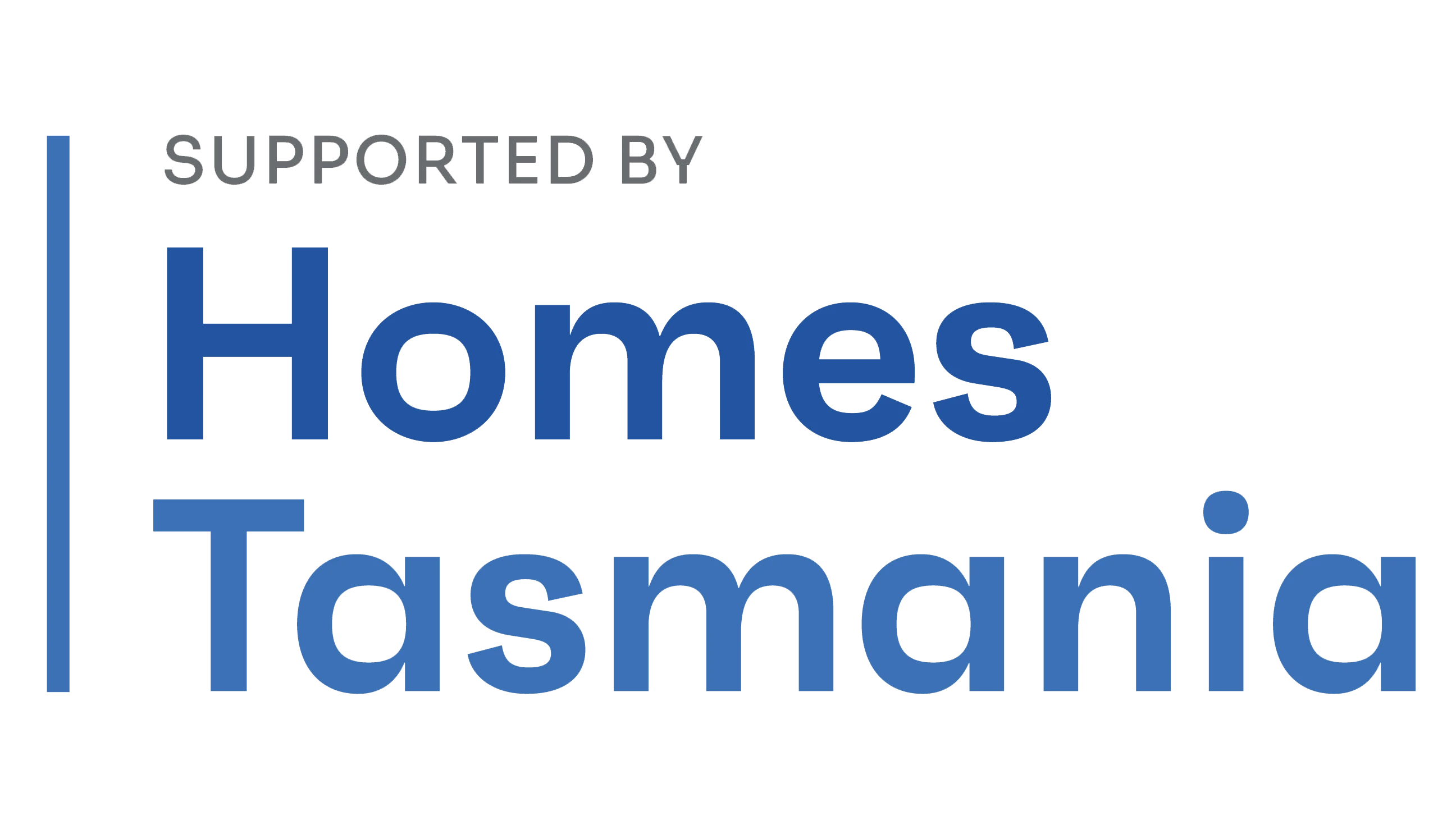Forced to flee Iraq with their three young daughters to escape persecution by ISIS, parents Nashwan and Naderah have been embraced by the Catholic Community and its many support programs as they settle into their new life in Tasmania.
Leaving Iraq was not something that Nashwan and Naderah had ever planned. But when ISIS invaded the city of Mosul in mid-2014, they were forced to make a decision about their future. “We don’t think that one day we would leave Iraq, because we have everything. I had a job as a teacher, and Nashwan had work, and everything we have – it’s a good life,” Naderah said.
The family had just built a new home, and Nashwan – a talented blacksmith with his own metalwork business – had created elaborate metalwork to decorate the house’s staircase and doors. “We were happy in Iraq,” Naderah said. “But in just one hour, everything changed.”
The family fled to Naderah’s home town of Qaraqosh, also known as Bakhdida, a town 50 kilometres from Mosul, and with a large Syrian Catholic population.
In August 2014, ISIS reached Qaraqosh, and local Christians were given three choices: convert to Islam, pay money, or be killed, an impossible choice for the family, whose Catholic faith is – as Nashwan puts it – ‘number one’.
“We are Christians, we can’t change our religion,” he said. “They killed many people … Everything is gone. We lost everything.”
So when Qaraqosh was invaded by ISIS, the family, along with Nashwan’s mother, made the decision to flee to northern Iraq. At first the family thought the Iraqi government would deal with the situation in Qaraqosh, but with no intervention and the situation still unsafe, they travelled as refugees to Jordan, where they were supported by the Catholic aid agency Caritas.
During two years in Amman, Nashwan volunteered at a Catholic parish, while Naderah taught refugee Iraqi children at a Caritas school.
They applied to enter Australia and were accepted. Along with other Iraqi and Syrian refugee families, they were supported by CatholicCare Tasmania’s Humanitarian Settlement Services Program, funded by the Commonwealth Government. During their initial months in Australia, CatholicCare Tasmania provided housing, connected them with schools, registered them with Centrelink, and were available for day-to-day support.
Their settlement team leader, Sindu, worked closely with the local Bridgewater-Brighton Catholic Parish, as most of the Iraqi and Syrian refugees were Catholic.
Nashwan and Naderah were housed in Bridgewater along with other refugee families, and they soon became embedded in the local community. They were initially in short-term accommodation, but they became so connected to the local community that they asked their case worker if they could stay in Bridgewater.
Discussions between the settlement program and Centacare Evolve Housing, a joint venture between CatholicCare Tasmania and Evolve Housing, led to a long-term tenancy in Bridgewater being arranged. The family enjoy attending Centacare Evolve Housing’s calendar of community celebrations.
They have become active members of the Bridgewater-Brighton Catholic Parish, joining in Sunday Mass as well as this lively parish’s many events and festivals. The girls are on the roster of altar servers, and the family have also been warmly welcomed at St Mary’s Cathedral where they regularly attend services and gatherings with the Iraqi and Syrian Catholic community, and are part of the community’s choir.
Catholic education is important to the family. All three daughters attended St Paul’s Catholic School and in 2020 the two older girls are at Dominic College. Religious Sister of Mercy, Sr Carmel Hinkley, who has a presence at St Paul’s three days a week, has been enormously supportive, the family says, as has Christian Brother, Br Sean McManus. The daughters
have been participants on Edmund Rice Camps.
Nashwan and Naderah are active parents in the school community and have taken part in partnership program Families And Schools Together at St Paul’s Catholic School for the past three years. Usually, a family attends one eight-week course, but for Nashwan and Naderah, the evenings – which include a family meal, activities, parent-to-parent support and socialising – are opportunities to meet community members and partners such as CatholicCare Tasmania, and they continue to be active participants.
The family have learned English since arriving, but when they are unable to understand a letter or communication in English they seek the help of CatholicCare Tasmania’s Multicultural Service Program, with Nashwan quick to count off the names of the MSP workers who have helped them in the past.
Recent surgery has meant Nashwan who had gained employment, first as a cleaner and then as a metalworker, had to leave his job, but he hopes to return to work soon. Naderah’s university qualifications as a primary school teacher are not recognised in Australia, and she has been undertaking studies through the Clemente program, partly funded by CatholicCare Tasmania and the Archdiocese of Hobart. She hopes to work with children.
Their garden at their house in Bridgewater is bursting with strawberries, peas, beans and tomatoes, to be used in their own cooking and also given away to their new neighbours and friends. Effective partnerships between programs and initiatives within the Catholic community and beyond and the establishment of positive relationships within the community have meant that their life in Tasmania continues to thrive.
Other news you may be interested in
Forced to flee Iraq with their three young daughters to escape persecution by ISIS, parents Nashwan and Naderah have been embraced by the Catholic Community and its many support programs as they settle into their new life in Tasmania.
Leaving Iraq was not something that Nashwan and Naderah had ever planned. But when ISIS invaded the city of Mosul in mid-2014, they were forced to make a decision about their future. “We don’t think that one day we would leave Iraq, because we have everything. I had a job as a teacher, and Nashwan had work, and everything we have – it’s a good life,” Naderah said.
The family had just built a new home, and Nashwan – a talented blacksmith with his own metalwork business – had created elaborate metalwork to decorate the house’s staircase and doors. “We were happy in Iraq,” Naderah said. “But in just one hour, everything changed.”
The family fled to Naderah’s home town of Qaraqosh, also known as Bakhdida, a town 50 kilometres from Mosul, and with a large Syrian Catholic population.
In August 2014, ISIS reached Qaraqosh, and local Christians were given three choices: convert to Islam, pay money, or be killed, an impossible choice for the family, whose Catholic faith is – as Nashwan puts it – ‘number one’.
“We are Christians, we can’t change our religion,” he said. “They killed many people … Everything is gone. We lost everything.”
So when Qaraqosh was invaded by ISIS, the family, along with Nashwan’s mother, made the decision to flee to northern Iraq. At first the family thought the Iraqi government would deal with the situation in Qaraqosh, but with no intervention and the situation still unsafe, they travelled as refugees to Jordan, where they were supported by the Catholic aid agency Caritas.
During two years in Amman, Nashwan volunteered at a Catholic parish, while Naderah taught refugee Iraqi children at a Caritas school.
They applied to enter Australia and were accepted. Along with other Iraqi and Syrian refugee families, they were supported by CatholicCare Tasmania’s Humanitarian Settlement Services Program, funded by the Commonwealth Government. During their initial months in Australia, CatholicCare Tasmania provided housing, connected them with schools, registered them with Centrelink, and were available for day-to-day support.
Their settlement team leader, Sindu, worked closely with the local Bridgewater-Brighton Catholic Parish, as most of the Iraqi and Syrian refugees were Catholic.
Nashwan and Naderah were housed in Bridgewater along with other refugee families, and they soon became embedded in the local community. They were initially in short-term accommodation, but they became so connected to the local community that they asked their case worker if they could stay in Bridgewater.
Discussions between the settlement program and Centacare Evolve Housing, a joint venture between CatholicCare Tasmania and Evolve Housing, led to a long-term tenancy in Bridgewater being arranged. The family enjoy attending Centacare Evolve Housing’s calendar of community celebrations.
They have become active members of the Bridgewater-Brighton Catholic Parish, joining in Sunday Mass as well as this lively parish’s many events and festivals. The girls are on the roster of altar servers, and the family have also been warmly welcomed at St Mary’s Cathedral where they regularly attend services and gatherings with the Iraqi and Syrian Catholic community, and are part of the community’s choir.
Catholic education is important to the family. All three daughters attended St Paul’s Catholic School and in 2020 the two older girls are at Dominic College. Religious Sister of Mercy, Sr Carmel Hinkley, who has a presence at St Paul’s three days a week, has been enormously supportive, the family says, as has Christian Brother, Br Sean McManus. The daughters
have been participants on Edmund Rice Camps.
Nashwan and Naderah are active parents in the school community and have taken part in partnership program Families And Schools Together at St Paul’s Catholic School for the past three years. Usually, a family attends one eight-week course, but for Nashwan and Naderah, the evenings – which include a family meal, activities, parent-to-parent support and socialising – are opportunities to meet community members and partners such as CatholicCare Tasmania, and they continue to be active participants.
The family have learned English since arriving, but when they are unable to understand a letter or communication in English they seek the help of CatholicCare Tasmania’s Multicultural Service Program, with Nashwan quick to count off the names of the MSP workers who have helped them in the past.
Recent surgery has meant Nashwan who had gained employment, first as a cleaner and then as a metalworker, had to leave his job, but he hopes to return to work soon. Naderah’s university qualifications as a primary school teacher are not recognised in Australia, and she has been undertaking studies through the Clemente program, partly funded by CatholicCare Tasmania and the Archdiocese of Hobart. She hopes to work with children.
Their garden at their house in Bridgewater is bursting with strawberries, peas, beans and tomatoes, to be used in their own cooking and also given away to their new neighbours and friends. Effective partnerships between programs and initiatives within the Catholic community and beyond and the establishment of positive relationships within the community have meant that their life in Tasmania continues to thrive.
Other news you may be interested in
Other news








